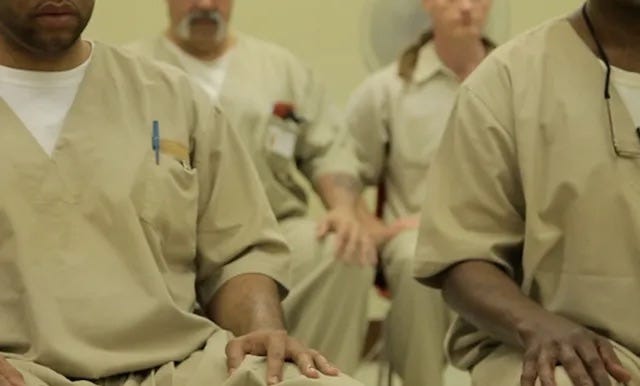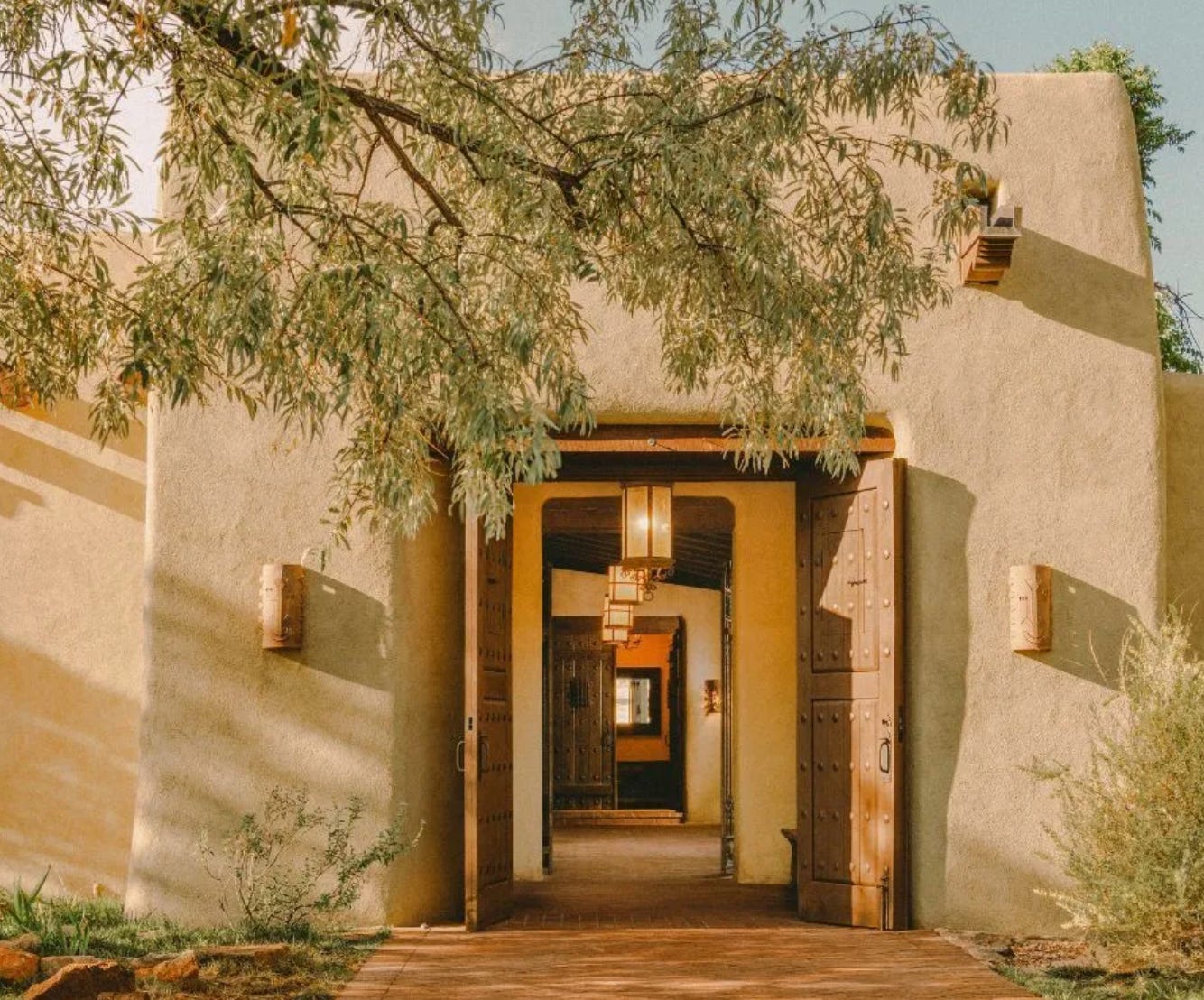There was one empty chair.
“Who are we missing?” I asked the young men dressed in various shades of green and seated in a small, bland classroom beneath brutal florescent lights.
It was my third consecutive week teaching meditation in this youth correctional facility, which houses nearly 450 individuals, all between the ages of 18 and 24. We had just been relocated to this classroom, likely because I had pointed out to the program supervisor that our former classroom had three broken chairs and no clock on the wall. Which was an issue because every time I entered the facility I had to leave my typical time-telling devices, my iPhone and Apple watch, in the car.
(speaking of prison clocks check out the stunning essay “Learning to Measure Time in Love and Loss” by Chris Huntington, which I came across in an Andrew Garfield Modern Love podcast episode I previously mentioned)
From the back of the room, someone spoke up. “The guy who asks all the questions,” he answered.
Instantly I remembered who was missing. Quiet with curious eyes and a babyface. But that’s not what made him stand out (In fact, everyone in the room had a babyface. Because they’re just so young!). The missing meditation student stood out because, as the guy in the back of the room had so astutely noted, he asked a lot of questions.
I cover a lot of basic things in my meditation class. How to sit. How to breathe. What to do with the mantra. What to do about thoughts. How to build a habit. But no matter what subject I was talking about, the guy who asks all the questions would always raise his hand and ask the most clear, yet most profound question.
Does meditation lead to happiness?
Does meditation make you feel more peaceful?
Can meditation help you access your true self?
His questions were always about the BIG STUFF of being human. And they got my attention. Because while I enjoy talking through the basics of the technique and always want to ensure people understand how to practice properly, I especially love discussing the impact of meditation. In fact, as I repeat often, meditation isn’t about what happens with your eyes closed; it’s about how your life is transformed when your eyes are open.
Just as I started to think that the guy who asks all the questions was not returning to class this week, he came walking around the corner, mumbled hello, and sat down in the empty chair.
I began class by asking everyone to revisit their answer to the question I had asked on day one: WHY do you want to learn how to meditate? Reconnecting with their WHY was going to be critical if they really wanted to make their meditation practice a daily habit. I wrote some of their answers on the whiteboard:
stress relief
anger issues
calm down
escape
sleep better
Next we checked in on how their practice was going and then we meditated together, before I taught about stress, the nervous system, and the mind. Some of the students slouched. Others squirmed. A few—including the guy who asks all the questions—seemed dialed in the entire time, like they were hanging on my every word. Soon class ended and everyone filed out. Except for him. Now the last empty chair was the only chair that was occupied.
“Can you please remind me of your name?” I asked.
“Jordan,” the guy who asks all the questions answered. I wasn’t sure if it was his first or last name. In prison, they typically go by their last names, but in class some individuals will choose to use their first names.
“You know, some guys say they’re here because meditation helps them escape their thoughts,” he said, pointing up at the board where I had written their WHYs. “But it’s not doing that for me.”
I listened.
“I’ve got a lot of problems. There are thoughts in my mind that I can’t escape.”
He paused. “My son died recently,” he said before putting his head down. “And my family has a lot of issues.”
Gut punch. I looked more closely at his babyface. Now I could see the kind of weariness that has no regard for age.
“I’m so sorry. I can’t imagine what you’re going through,” I responded, aware of the fact that among the difficult things he’s going through, he didn’t even explicitly mention the challenges of being incarcerated.
“When I meditate,” he continued, “I just want to try and forget all of it, but I can’t. So what should I do?”
I nodded. “That makes complete sense. You are holding so much right now.”
Then I encouraged him to keep meditating, explaining that since he’s a new meditator and there’s so much stress and trauma that he’s been carrying, it’s going to take some time—not much, but a little more—before he touches upon inner peace and quiet in his meditation.
I also reminded him about an essential feature of this particular meditation technique: it isn’t about pushing away thoughts, no matter how unpleasant they might be. Nor is it about avoiding feelings. While this style helps the meditator move beyond thoughts—aka “escape” thoughts—this state isn’t something arrived at by effort or forcing. Instead, I reminded him, allowing thoughts and feelings, however heavy they may be—is part of his healing process.
I said a few more things too, but all I really wanted to do was give him a big hug. But that would violate the no contact rules for prison volunteers and inmates.
He hesitated for a second. “I guess I don’t really want to try and escape,” he said. “You know what I mean?”
I knew exactly what he meant. He didn’t have a word for it, but he was talking about grief.
Being present to our deep sadness is painful. It’s hard. It’s haunting. So, naturally, a part of us wants to escape it. A part of him wanted to escape it.
And yet, being in touch with our sorrow is also something that makes us feel… alive. Real. Fully human. It reconnects us to the deepest part of who we are, the authentic self. Jordan was experiencing this too.
The guy who asks all the questions didn’t need to be able to describe this seemingly contradictory nature of grief. He didn’t need to say any of this in that moment. But I could sense that despite the brutality of his life and, yes, also because of it, there was an aliveness stirring in him. And so both things were true—he wanted to escape and engage what he was feeling.
We wrapped up our conversation and then walked down the hall where I reunited with a corrections officer who would escort me through security and out of the prison.
“See you next week,” Jordan said.
“Looking forward to it,” I replied.
And just before he turned to go back to his cell, I thought I saw a different look flash across his face. He looked lighter. But also stronger. As if he was more aware of his courage.
The courage to carry his grief.
The courage to heal.
The same courage that had already made him the guy who asks all the questions about the BIG STUFF of being human.
*If you’re interested in helping me support people like Jordan, you can make a tax-deductible year-end donation to the WITHIN Project or sign up for a paying subscription to this newsletter
*Also, if you’re interested in learning to meditate or take your practice to the next level in 2025, let me know!
Ready for a Midlife Reset? Join me in Santa Fe!
If you’ve been grinding hard,
feeling stuck,
or just craving clarity,
it’s time to hit pause.
Join me and Chip Conley (Modern Elder Academy Co-Founder & Author of Learning to Love Midlife) from January 27 to February 1, 2025 in Santa Fe for "Discovering the Hero’s Journey in Midlife"—an immersive retreat to recharge, reflect, and reimagine your next chapter.
Think mindfulness, storytelling, deep conversations, and a supportive space to rediscover you. 🔥
And all of this in the stunning and rejuvenating setting of Rising Circle Ranch—one of TIME's 2024 World's Greatest Places! 🤩
Spots are limited—don’t wait!
Learn more and register here.






